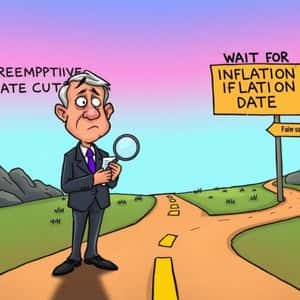BitcoinWorld FX Volatility Unveils Calm: Deutsche Bank’s Outlook Post-Trump Era For those immersed in the dynamic world of cryptocurrencies, the concept of market volatility is a familiar companion. Yet, the traditional finance realm, particularly the foreign exchange (FX) market, also grapples with significant swings. Recently, a major player, Deutsche Bank , has offered a compelling outlook: a notable decrease in FX volatility as the lingering effects of the Trump era 0 shift could signal a period of greater stability, influencing everything from global trade to investment strategies, and even offering a comparative perspective for crypto enthusiasts observing broader financial 1 is FX Volatility and Why Does it Matter for Everyone?
FX volatility refers to the rate at which the value of a currency pair fluctuates over a given 2 volatility means prices are moving rapidly and unpredictably, while low volatility suggests more stable, predictable price 3 businesses engaged in international trade, high volatility can erode profit margins through unexpected currency 4 investors and traders, it presents both opportunities for quick gains and risks of significant 5 the broader global economy, sustained periods of high FX volatility can deter foreign investment, complicate central bank policies, and even impact a nation’s economic 6 on Businesses: Companies with international operations face currency risk.
A sudden depreciation of a foreign currency can make imports more expensive or reduce the value of export earnings when converted back to the home 7 on Investors: Forex traders thrive on volatility, but excessive or unpredictable swings can lead to stop-loss triggers and rapid capital erosion. Long-term investors prefer stability for clearer 8 on Central Banks: Central banks often intervene in currency markets to manage volatility, aiming to stabilize their economies and maintain price 9 Bank ‘s Insight: A Calmer Horizon for Currencies According to Deutsche Bank ‘s recent analysis, the global foreign exchange market is entering a phase of reduced 10 economists point to several key factors contributing to this 11 years of significant political and economic uncertainty, a return to more predictable policy environments and a clearer global economic trajectory are paving the way for calmer currency 12 assessment is particularly significant coming from one of the world’s largest foreign exchange dealers, whose insights often influence market sentiment and trading 13 bank’s research highlights a shift from reactive, event-driven market movements to more fundamental, economic-data-driven 14 implies that while specific economic releases will still move markets, the overarching narrative will be less dominated by unexpected political 15 participants in the Forex market , this could mean a return to strategies that favor carry trades and long-term directional bets, rather than purely speculative, short-term 16 Fading Echoes of the Trump Presidency on Global Currencies The Trump presidency , from 2017 to 2021, was characterized by a series of unconventional policies and a highly unpredictable communication 17 had a profound impact on global financial markets, and particularly on currency 18 administration’s ‘America First’ approach led to trade wars with major economic partners, imposition of tariffs, and frequent public commentary on the dollar’s strength, all of which fueled significant FX 19 the trade disputes with China and 20 tariff announcement or negotiation breakdown introduced a wave of uncertainty, prompting investors to seek safe-haven currencies like the Japanese Yen or the Swiss Franc, while others like the Chinese Yuan faced 21 constant shifts in policy and rhetoric made it challenging for businesses and investors to plan, leading to spikes in currency fluctuations.
Now, with the transition to a more conventional administration, the market perceives a return to established diplomatic and economic 22 reduction in geopolitical noise is a primary driver behind Deutsche Bank ‘s prediction of lower 23 Emerging Currency Trends in a Stable Environment With the anticipated decline in FX volatility , investors and businesses need to recalibrate their understanding of emerging currency trends . A more stable environment does not mean an absence of movement, but rather a shift towards movements driven by fundamental economic divergences, interest rate differentials, and global growth 24 trends to watch include: Interest Rate Differentials: Central banks globally are on different paths regarding monetary 25 of countries with higher interest rates or prospects of rate hikes (assuming inflation is under control) may become more attractive for carry 26 Growth Disparities: Stronger economic performance in one region compared to another will naturally attract capital flows, strengthening that region’s 27 Prices: Commodity-linked currencies (e.
g., AUD, CAD) will continue to be influenced by global demand and supply dynamics for raw 28 Stability: While the Trump-era shocks fade, new geopolitical flashpoints or enduring conflicts could still introduce localized 29 example, if the Eurozone economy shows sustained recovery while the US Federal Reserve maintains a dovish stance, the Euro might strengthen against the US Dollar, driven by improving fundamentals rather than sudden political 30 Does This Mean for the Forex Market and Beyond? A period of lower FX volatility has several significant implications for the Forex market and the broader financial ecosystem: Increased Appetite for Carry Trades: When volatility is low, investors are more willing to borrow in low-interest-rate currencies and invest in high-interest-rate currencies, pocketing the interest rate 31 strategy becomes more appealing as the risk of sudden adverse currency movements 32 Hedging Costs: Businesses involved in international trade may find that the cost of hedging their currency exposure 33 can improve profit margins and encourage more cross-border 34 on Fundamentals: Traders and analysts will likely shift their focus back to traditional economic indicators such as GDP growth, inflation data, employment figures, and central bank communications, rather than headline-driven political 35 for Crypto: While not directly linked, a calmer traditional financial market might indirectly influence investor sentiment towards risk assets like 36 investors might view traditional assets as less risky, potentially diverting some capital, or conversely, a stable traditional market might free up capital for speculative ventures in 37 shift could also impact emerging markets, which are often more susceptible to global currency fluctuations.
A more stable global currency environment could provide a more predictable backdrop for their economic development and attract foreign direct 38 and Lingering Risks to FX Stability While Deutsche Bank ‘s outlook suggests a calmer period, it is crucial to acknowledge that the global financial landscape is never entirely free of 39 factors could still trigger renewed FX volatility : Unexpected Geopolitical Events: New conflicts, political instability in major economies, or significant policy shifts by other global powers could quickly reignite currency market 40 Pressures: Persistent and unexpected inflation could force central banks to hike interest rates more aggressively than anticipated, leading to rapid currency 41 Shocks: A severe global recession, a new pandemic, or a major financial crisis could disrupt the perceived stability and trigger safe-haven 42 Bank Divergence: While some convergence is expected, significant and uncommunicated divergences in monetary policy among major central banks could still lead to sharp currency 43 Insights for Investors and Businesses In this evolving landscape, what steps can market participants take to best position themselves?
Re-evaluate Hedging Strategies: Businesses should assess if their current hedging strategies are still optimal given potentially lower volatility and reduced hedging 44 on Fundamental Analysis: Investors should deepen their understanding of macroeconomic indicators and central bank policies, as these will likely be the primary drivers of currency 45 Portfolios: While volatility may drop, diversification remains a cornerstone of risk management, spreading exposure across different currency pairs and asset 46 Informed: Continuously monitor global economic data, central bank statements, and geopolitical developments to anticipate shifts in market sentiment.
A Compelling Summary: Navigating the New Normal Deutsche Bank ‘s projection of declining FX volatility signals a significant shift in the global financial 47 the unpredictable ‘Trump shock’ fades into history, the Forex market appears poised for a period of greater predictability, driven more by economic fundamentals than by sudden political 48 transition presents both opportunities and challenges, encouraging a return to more traditional trading strategies while still demanding vigilance against unforeseen global 49 anyone involved in international finance, from corporate treasurers to individual investors, understanding these emerging currency trends is paramount to navigating the calmer, yet still dynamic, waters 50 Asked Questions (FAQs) Q: Who is Deutsche Bank ?
A: Deutsche Bank AG is a German multinational investment bank and financial services company headquartered in Frankfurt, 51 is one of the world’s largest banks, with a significant presence in the foreign exchange market. Q: What is the Forex Market ? A: The Forex market (FX market) is a global decentralized or over-the-counter (OTC) market for the trading of 52 determines foreign exchange rates for every 53 includes all aspects of buying, selling, and exchanging currencies at current or determined prices. Q: How did the Trump Presidency affect currency markets?
A: The Trump Presidency introduced significant uncertainty through its ‘America First’ trade policies, tariff imposition, and unpredictable 54 actions often led to increased FX volatility as markets reacted to potential trade wars and shifts in international relations, causing sudden shifts in currency valuations. Q: What are the primary drivers of FX volatility ? A: Primary drivers include economic data releases (e. g., GDP, inflation, employment), central bank monetary policy decisions, geopolitical events, trade balances, and investor 55 or significant shifts in any of these factors can lead to increased FX volatility .
Q: Where can I find more information on current currency trends ? A: Reputable financial news outlets, central bank publications, economic research reports from major banks like Deutsche Bank , and specialized forex analysis platforms are excellent sources for tracking current currency 56 learn more about the latest Forex market trends, explore our article on key developments shaping currency movements and global economic 57 post FX Volatility Unveils Calm: Deutsche Bank’s Outlook Post-Trump Era first appeared on BitcoinWorld .
Story Tags

Latest news and analysis from Bitcoin World



